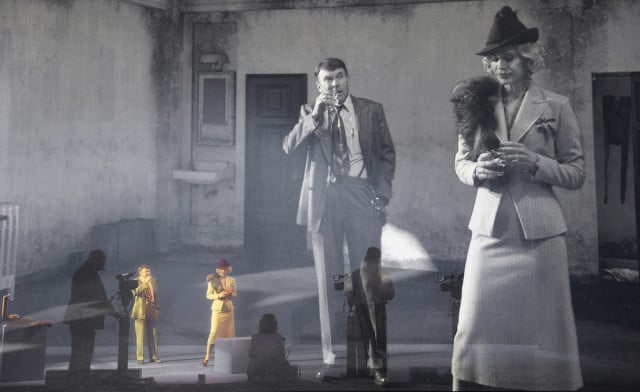Art & Exhibitions
A Movay? Cineater? At BAM, Stan Douglas Creates a Perfect Movie-Play Hybrid
THE DAILY PIC: Long a genius of video, Douglas has now added live action.

THE DAILY PIC: Long a genius of video, Douglas has now added live action.

Blake Gopnik

THE DAILY PIC (#1413): It’s not often you get to be in on the birth of a new medium. But that’s how I felt Wednesday night at the first New York screening – sorry, performance – of Helen Lawrence, the new piece of theater – sorry, of cinema – by Vancouver artist Stan Douglas, in a production on tour from Canadian Stage in Toronto. The show (there, that’s a safe term), which runs for two more nights at the Brooklyn Academy of Music, is a perfect hybrid of screen and stage.
The cinematic is represented by a huge, translucent scrim that hangs down where BAM’s theatrical curtain would normally descend. Lifelike scenes of Vancouver’s underbelly, circa 1948, have been digitally recreated by Douglas’s technical wizards and are projected onto the scrim in black and white; they function as the sets for a film noir that Douglas has decided to give us. Perfectly visible through the scrim, on a bare stage painted entirely in blue-screen blue, stand costumed players acting out the plot of that noir. As they act, their characters get digitally inserted into the projections of the sets on the scrim, appearing there in real time (but black and white) as the players move and speak their lines. The marriage on the scrim is so perfect that you can’t feel any seams between living people and the inanimate – and computer-generated – environments that they’ve been transported into. (Click on my image to see some clips.)
On the stage, traditional live theater; on the scrim, a traditional film. In between is us, flicking our attention and interest between the two ways of presenting precisely the same content, at the same time.
Douglas’s new medium gives an automatic dose of Brechtian distantiation: By seeing the actors prancing about without sets, we immediately feel the extreme artifice behind the night’s production. (That’s helped by the fact that any actor not playing in a given scene is manning the cameras that are shooting it, for closed-circuit insertion into the scrim’s virtual word; the collapse of the show’s actor and videographer roles is an important detail that many viewers may miss.) Even as we’re being “distantiated” by what’s going on behind the scrim, however, its surface treats us to the extreme reality effects of cinema, which force us to suspend disbelief. In fact, the black and white figures in the “movie” seem more real and present than their live, full-color avatars, because the projections are far bigger and closer to us.
It’s not often that we’re treated to a perfect marriage of Brecht and Hitchcock – or is it an explosion of both?
I’m not sure that Douglas has totally mastered his own creation: His story is not as compelling, or as daring, as the medium he’s invented to tell it. But as the very first full example of cineater – or is it a movay? – Helen Lawrence has got to be seen to be … disbelieved. (Photo by David Cooper, courtesy BAM)
For a full survey of past Daily Pics visit blakegopnik.com/archive.